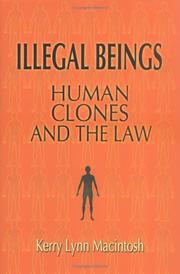| Listing 1 - 10 of 15 | << page >> |
Sort by
|
Book
Abstract | Keywords | Export | Availability | Bookmark
 Loading...
Loading...Choose an application
- Reference Manager
- EndNote
- RefWorks (Direct export to RefWorks)
Book
Year: 2002 Publisher: Reading (Mass) : Cambridge University Press,
Abstract | Keywords | Export | Availability | Bookmark
 Loading...
Loading...Choose an application
- Reference Manager
- EndNote
- RefWorks (Direct export to RefWorks)
DROIT MEDICAL --- BIOETHIQUE --- EXPERIMENTATION MEDICALE --- THERAPIE GENETIQUE
Book
Year: 2004 Publisher: Antwerpen : Intersentia,
Abstract | Keywords | Export | Availability | Bookmark
 Loading...
Loading...Choose an application
- Reference Manager
- EndNote
- RefWorks (Direct export to RefWorks)
SOINS DE SANTE --- DROIT DE LA SANTE --- DROIT MEDICAL --- MEDECINE --- MILIEU HOSPITALIER --- DROIT PHARMACEUTIQUE --- MEDICAMENTS --- DEONTOLOGIE / ETHIQUE --- BELGIQUE --- REGLEMENTATION EUROPEENNE --- BIOETHIQUE --- PRATIQUES --- COMITES D'ETHIQUE --- EXPERIMENTATION MEDICALE --- PROCEDURE
Book
ISBN: 2711005674 9782711005673 Year: 2005 Publisher: Paris : Litec = Librairie de la Cour de Cassation,
Abstract | Keywords | Export | Availability | Bookmark
 Loading...
Loading...Choose an application
- Reference Manager
- EndNote
- RefWorks (Direct export to RefWorks)
Medical laws and legislation --- Biotechnology industries --- Bioethics. --- Law and legislation --- Medical laws and legislation - France. --- Biotechnology industries - Law and legislation - France. --- DROIT MEDICAL ET BIOETHIQUE --- DROIT MEDICAL --- CLONAGE --- EMBRYON HUMAIN --- PRELEVEMENT D'ORGANES --- EXAMEN GENETIQUE --- FRANCE --- BIOETHIQUE --- EXPERIMENTATION MEDICALE
Book
ISBN: 9782707178350 2707178357 Year: 2014 Volume: 398 Publisher: Paris: La Découverte,
Abstract | Keywords | Export | Availability | Bookmark
 Loading...
Loading...Choose an application
- Reference Manager
- EndNote
- RefWorks (Direct export to RefWorks)
Expérimentation médicale --- Médecine --- --Histoire --- --XVIIIe s., --- XIXe s., --- 7658 --- Expérimentation humaine en médecine --- Éthique médicale --- --Médecine --- Histoire --- XVIIIe s., 1701-1800 --- XIXe s., 1801-1900

ISBN: 0421783303 9780421783300 Year: 2003 Publisher: London: Sweet and Maxwell,
Abstract | Keywords | Export | Availability | Bookmark
 Loading...
Loading...Choose an application
- Reference Manager
- EndNote
- RefWorks (Direct export to RefWorks)
Genetic engineering --- Genes --- Law and legislation --- Patents. --- Patents --- Designed genetic change --- Engineering, Genetic --- Gene splicing --- Genetic intervention --- Genetic surgery --- Units of heredity --- Units of inheritance --- Heredity --- Molecular genetics --- DNA --- Genetic recombination --- Biotechnology --- Transgenic organisms --- Genetic engineering - Law and legislation - Great Britain. --- Genes - Great Britain - Patents. --- DROIT MEDICAL --- BIOETHIQUE --- EXPERIMENTATION MEDICALE --- THERAPIE GENETIQUE --- OGM

ISBN: 0521853281 110716558X 9786611113056 0511337930 1139131400 0511511477 1281113050 051133849X 0511336756 051133740X 9780511252945 0511252943 9780511254390 0511254393 9780511338496 9780511511479 9780521853286 Year: 2005 Publisher: Cambridge New York Cambridge University Press
Abstract | Keywords | Export | Availability | Bookmark
 Loading...
Loading...Choose an application
- Reference Manager
- EndNote
- RefWorks (Direct export to RefWorks)
Many people think human reproductive cloning should be a crime. In America some states have already outlawed cloning and Congress is working to enact a national ban. Meanwhile, scientific research continues, both in America and abroad and soon reproductive cloning may become possible. If that happens, cloning cannot be stopped. Infertile couples and others will choose to have babies through cloning, even if they have to break the law. This book explains that the most common objections to cloning are false or exaggerated. The objections reflect and inspire unjustified stereotypes about human clones and anti-cloning laws reinforce these stereotypes and stigmatize human clones as subhuman and unworthy of existence. This injures not only human clones, but also the egalitarianism upon which our society is based. Applying the same reasoning used to invalidate racial segregation, this book argues that anti-cloning laws violate the equal protection guarantee and are unconstitutional.
Status of persons --- United States --- Law --- General and Others --- Human cloning --- Human reproductive technology --- Law and legislation --- Research --- Law and legislation. --- Moral and ethical aspects. --- Assisted conception --- Assisted human reproduction --- Assisted human reproductive technology --- Conception --- Human assisted reproduction --- Human assisted reproductive technology --- Human reproduction --- Medical technology --- Reproductive technology --- Human beings --- Cloning --- Technological innovations --- DROIT MEDICAL --- BIOETHIQUE --- EXPERIMENTATION MEDICALE --- THERAPIE GENETIQUE --- CLONAGE --- PRINCIPE DE PRECAUTION --- LOIS ANTICLONAGE --- United States of America

ISBN: 9041117423 1417551488 9781417551484 9789041117427 128046805X 9786610468058 9047403061 9789047403067 Year: 2002 Volume: 52 Publisher: Boston Kluwer Academic Publishers
Abstract | Keywords | Export | Availability | Bookmark
 Loading...
Loading...Choose an application
- Reference Manager
- EndNote
- RefWorks (Direct export to RefWorks)
Scientific research on biotechnologies has become the protagonist of discoveries that exert a formidable impact on public opinion. Every day popular opinion is challenged by the media, so that it becomes not only a witness of these developments, but is also, to a certain extent, forced to become a judge of those cases where human and animal genetics have been investigated over the last decades. The man-in-the-street is thus confronted by moral positions ranging from cautious approval, to wait-and-see attitudes, to unconditional condemnation. On the other hand, scientists are involved in the ethical evaluation of the results of their own research. However, the results of scientific pursuits are capable of producing immediate effects on the daily life of every human being. Consequently, alongside the scientists, people feel strongly about their need and their right to contribute to an accurate assessment of the effects of science on society. This is a collection of essays reflecting a considerable range of different cultural experiences and different ethical underpinnings. The main subject is cloning. Cloning is the most accessible and most readily perceived point of convergence from which ethical judgments on the current developments of scientific investigations can be proposed. Cloning is also the `paradox' on which the confrontation between scientific research and popular imagination is focused.
Bioethics. --- Cloning --- Medical ethics. --- Moral and ethical aspects. --- Bioethics --- Medical ethics --- Clonage --- Bioéthique --- Ethique médicale --- Moral and ethical aspects --- Law and legislation --- Aspect moral --- Droit --- EPUB-LIV-FT SPRINGER-B --- Biomedical ethics --- Clinical ethics --- Ethics, Medical --- Health care ethics --- Medical care --- Medicine --- Professional ethics --- Nursing ethics --- Social medicine --- Biology --- Life sciences --- Life sciences ethics --- Science --- Genetic engineering --- Reproduction, Asexual --- DROIT MEDICAL --- BIOETHIQUE --- EXPERIMENTATION MEDICALE --- THERAPIE GENETIQUE --- CLONAGE

ISBN: 2738107222 9782738107220 Year: 1999 Publisher: Paris Editions Odile Jacob
Abstract | Keywords | Export | Availability | Bookmark
 Loading...
Loading...Choose an application
- Reference Manager
- EndNote
- RefWorks (Direct export to RefWorks)
Birth control --- Man-woman relationships --- 241.64*7 --- Female-male relationships --- Male-female relationships --- Men --- Men-women relationships --- Relationships, Man-woman --- Woman-man relationships --- Women --- Women-men relationships --- Interpersonal relations --- Mate selection --- Population control --- Pregnancy --- Family planning --- Contraception --- Reproductive rights --- Relations with women --- Relations with men --- Prevention --- Birth Conrol --- Animal transgénique --- Contamination biologique --- Biological contamination --- Zoonose --- Hygiène des aliments --- Food hygiene --- genetic engineering --- Transgenic plants --- Transgenic animals --- blood --- Zoonoses --- public health --- Environmental impact --- Regulations --- Ethics --- France --- RISK ASSESSMENT --- ENVIRONMENTAL STANDARDS --- EXPERIMENTATIONS MEDICALES --- DROIT MEDICAL --- BIOETHIQUE --- EXPERIMENTATION MEDICALE --- PRINCIPE DE PRECAUTION --- Gender --- Human rights --- Book --- Chiffres --- le principe de précaution --- droit civil --- la France
Book
ISBN: 9062157416 9789062157419 Year: 2000 Volume: 13 Publisher: Antwerpen Maklu
Abstract | Keywords | Export | Availability | Bookmark
 Loading...
Loading...Choose an application
- Reference Manager
- EndNote
- RefWorks (Direct export to RefWorks)
Deel I: Geoorloofdheid experimentele handelingen - Deel II: Civielrechtelijke aansprakelijkheid
Medical law --- Tort and negligence --- Deontologie --- Déontologie --- Ethique médicale --- Medische ethiek --- Human experimentation in medicine --- Law and legislation --- -001.891 --- 174.2 --- 351.84*7 --- biomedisch, medisch-wetenschappelijk onderzoek --- experiment, experimenteel onderzoek (mensen) --- aansprakelijkheid (schadevergoeding, burgerlijke aansprakelijkheid, beroepsaansprakelijkheid) --- rechtsvergelijking --- rechtsbescherming --- België --- 13.01.B --- Experimentation on humans, Medical --- Medical experimentation on humans --- Medical ethics --- Medicine --- Medicine, Experimental --- Clinical trials --- recherche biomédicale --- expérimentation sur la personne humaine (chez l'humain) --- responsabilité (indemnisation, responsabilité civile, responsabilité professionnelle) --- droit comparé --- protection juridique --- Belgique --- Wettelijke en contractuele aansprakelijkheid ; Algemeen ; België --- Research --- 001.891 --- België --- responsabilité (indemnisation, responsabilité civile, responsabilité professionnelle) --- recherche biomédicale --- expérimentation sur la personne humaine (chez l'humain) --- droit comparé --- Wettelijke en contractuele aansprakelijkheid ; Algemeen ; België --- E-books --- Human experimentation in medicine - Law and legislation - Belgium --- DROIT MEDICAL --- EXPERIMENTATION MEDICALE --- BIOETHIQUE
| Listing 1 - 10 of 15 | << page >> |
Sort by
|

 Search
Search Feedback
Feedback About UniCat
About UniCat  Help
Help News
News